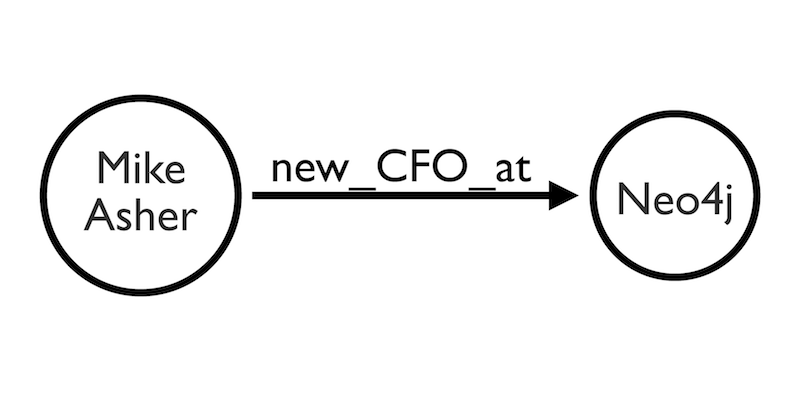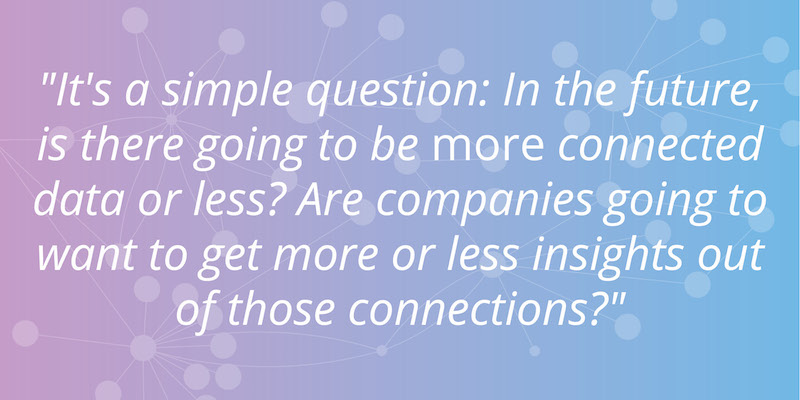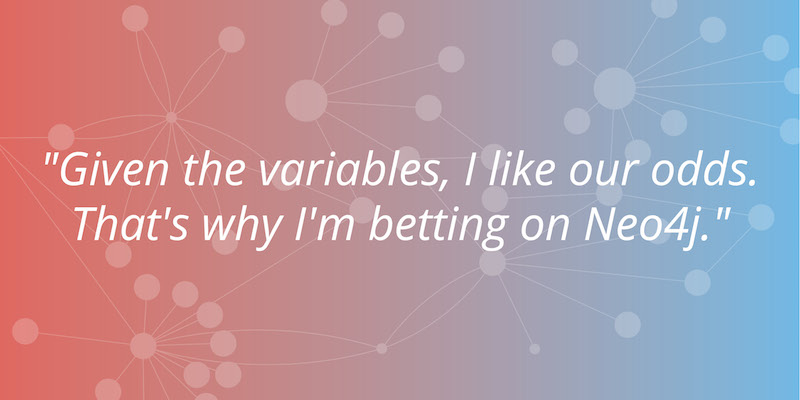It’s High Time Neo4j Had a CFO – Here’s Who We Chose [Interview]

CEO & Co-Founder, Neo4j, Inc.
8 min read

 Just yesterday, I got to announce the addition of Denise Persson – CMO at Snowflake – to the Neo4j Board of Directors.
Just yesterday, I got to announce the addition of Denise Persson – CMO at Snowflake – to the Neo4j Board of Directors.
Today, I get to announce another incredibly important executive appointment: Mike Asher has joined Neo4j as our inaugural chief financial officer (CFO).
Since Mike works from our global headquarters in San Mateo, California, he and I recently got to sit down for an interview. Here’s how it went.
For readers who don’t know you, could you tell us a bit of your professional background?
Mike: I grew up in Los Angeles, but came to UC Berkeley to study engineering as my undergrad. I really liked the Bay Area and decided to stay.
My first job was with Chevron in the East Bay – it wasn’t the typical Silicon Valley move, but I was still working as a programmer. I did that for a number of years but was then ready to move on and try something different. I wanted to go back to school but was split between a master’s in computer science versus an MBA. Ultimately, I decided to switch careers and go the business route, specializing in finance.
After graduation, I asked myself, “If I’m going to stay in the Bay Area, what am I doing working for a non-tech company?” The heart and soul of the Bay Area is definitely tech. I worked for a while at Cisco Systems – which was definitely the up-and-coming company at its time – before I decided to experiment with working at a startup.
And how did that go?
Mike: Well, it got off to a rough start.
I loved Silicon Valley, I loved tech, I loved finance, and I thought at the time that I’d really like startups too. So I ended up joining a startup in the computer networking space, but I really didn’t know what to look for in a startup. The organization had a lot of challenges. On paper, they looked fine, but underneath the surface, the product had big gaps and the leadership was questionable.
After I realized all this, I thought, “Is this what all startups are like?” Having worked for that questionable startup to begin with taught me a valuable lesson: It showed me what warning signs to look for in a failing organization. I think in the end it’s made me better at picking winners.
I realized I had made a bad choice and decided to give startups another shot. So I joined Octane Software, which had legitimate VC backing at the time, and I loved it. The company was a rocket ship and doing really well, and we ended up selling the company.
I would say that was my first real tech startup experience, and I was hooked. I’ve stuck with high-tech, fast-growing, VC-backed startups ever since.
Can you give us some examples of other startups you’ve worked with before joining Neo4j?
Mike: Sure. There are two companies in particular I’d like to highlight.
The first one was a company called Greenplum. It was a data warehouse built on an open source platform and sold as subscription software to enterprises. I think it did a good job disrupting its market at the time. We grew that company fast and ended up selling it to Dell EMC. It was a good exit.
I stayed on at EMC for about a year, before the former head of product at Greenplum formed a company called Platfora. Platfora was a way to take data out of Hadoop and put it in memory so you could deal with it blazingly fast and then eventually hand it over to other applications where you could visualize it. As a startup, it did really well and we ended up selling the company to Workday.
What made you want to join Neo4j?
Mike: To be honest, I didn’t want to at first! But I’d say there were three major threads that pulled me in.
First, it was the value prop of graphs. I was pretty happy in my last position, and I wasn’t looking for a new opportunity. When I got introduced to you, Emil, I was thinking, “Meh, I don’t know about this, but I’ll just go to breakfast with him.”
Of course, once we started talking, that all changed. It was way more interesting than I thought. Conceptually, graph databases made sense to me (a finance guy!), and I could see that the use cases of graph tech went way beyond just a few niche scenarios.
I could completely see where graph technology would work and where it would fit into the larger big data landscape. It was clear that the old way of doing things with only RDBMS wasn’t sufficient, and if the company could pull off this database paradigm shift, it would be pretty cool.
But I was still a little skeptical: It’s hard to create a database from scratch and move the market towards where you’re going. A lot of big enterprises – at least in my experience – have multiple databases, they have multiple BI tools, and they have all of these integration layers. The last thing these companies want is yet another thing to support. So unless the value proposition is really high, then it’s tough going for any startup trying to sell a new database.
Once I found out the Neo4j team had been doing this for a decade and had laid such a strong foundation, that changed my perspective. The company now has the wind at its back and can see the fruits of its labor.
In the end – despite my not looking for anything new at the time – I was convinced that this was a really exciting opportunity with a core IP that’s difficult to replicate, a product that’s differentiated in the market, and a strong leadership position in the space.
Second, I really liked the fact that the company cares about its employees. Neo4j has a great blend of the Silicon Valley fast-moving approach with a Swedish soul that treats employees like human beings. It’s evidenced by the tenure of employees here.
Before I join any company, I always talk to a few employees, most of whom tell me, “Oh, I’ve been here two months” or something like that. When I talked to folks at Neo4j, many of them had been here for years and years, including the engineers.
I believe as a company we have an opportunity to have the best of both worlds. We can have a Silicon Valley culture of innovation and winning, really balanced by a culture of caring about employees. If we can pull that off, we will be creating something unique. That was the second major draw for me.
The third, and final, reason was you – Emil. When we first started talking, I just found you to be a really genuine guy. No pretense; just what you see is what you get. I really liked that.
What do you see as the future of graph technology in the enterprise?
Mike: By joining Neo4j, I’m absolutely placing my vote of confidence in the belief that the graph technology market is growing and is about to get much, much bigger.
I think it’s really a simple question: In the future, is there going to be more connected data or less? Are companies going to want to get more insights out of their connections?
To me, it’s fairly obvious that the world we’re living in is going to need more and more of this type of connections-first data. And that means, companies will need a way to store, analyze, operationalize and visualize those critical connections. The market opportunity is definitely in our favor, and now it’s just incumbent on us to make sure we’re taking advantage of that.
How is Neo4j different from other companies where you’ve served in the CFO capacity? Anything that sets apart your experience so far?
Mike: I’d say there’s a couple of things.
One, we’re creating a brand-new market from scratch, so that is both interesting, scary and super exciting all at the same time. It’s much harder than a startup in an already-established market, but the rewards are much greater when you pull it off.
Two, I always talk to the sales team whenever I’m thinking about joining a startup. In a lot of cases, the sales people will tell me something like, “Well, I would do this and that, but the product isn’t capable enough,” but when I talked to the sales team at Neo4j, they told me how strong the product is and how the customers really like the product. So, to me that was a very different – and wonderful – proof point compared with some of the other startups I’ve joined.
All of the stuff I normally take care of as CFO – the finances, the communication, the metrics – that’s all the easy stuff, if you will. But if the core product and underpinning of the company isn’t solved, that’s much harder. At Neo4j, I think my job will be much easier since there’s such a solid product.
What are your key objectives in this new role, especially in the short and medium term?
Mike: Building on our strong foundation as a company, I always use a few of these guiding questions whenever I step into a new startup: How do we operationalize all of our current activities? How do we make it as efficient as possible so we can scale up the organization? What metrics, rules and accountabilities do we need in place in order to achieve our goals?
It’s very easy for a startup at our stage to do too many things at once. My job is to help keep us focused and to help us make smart, clear decisions about our most important priorities.
Another major objective of mine is how to align our very geographically distributed team (we even have some people working in Bangladesh!). Having a distributed team has is pros and cons, and it’s my job to think about efficient communication across and between all those teams.
Finally, there’s always the big picture. Being a CFO at a VC-backed startup (especially at this stage), my major goal is always to help the company grow from wherever it is to the next level of annual recurring revenue (ARR), hitting all of the major milestones of growth along the way.
A lot of that comes down to being an efficient, well-run company. I’ve seen a lot of the same patterns for companies at this stage, and I think that experience will – at the very least – help us avoid common mistakes and pitfalls, while replicating well-mapped roads to success.
How can the Neo4j community connect with you?
Mike: The best place to find me online is on LinkedIn.
Any closing thoughts – perhaps on the competition – to finish us off?
Mike: We’re certainly in a bit of a David-and-Goliath situation with so many big competitors now entering our space – a situation I’ve definitely been in before. But my bet is still on Neo4j as the leader of the graph technology space. Not just today, but years from now.
That’s because, when it comes to innovation, the best product is going to win if it’s highly differentiated. In my experience, it’s very hard for really large companies like Microsoft and Amazon, that have so many products in their portfolio, to focus on just one product or problem specifically. They can’t afford to focus on a space that – from their perspective – is too niche to worry about, so they never become the clear winner in those spaces.
We are 100% focused on solving a non-trivial problem – in fact, a very hard problem. Our differentiation and innovation create a big gap between us and the competition, which means we’ll win even though we can never outspend them in terms of marketing or feet-on-the-street sales people.
Given those variables, I like our odds. That’s why I’m betting on Neo4j.









